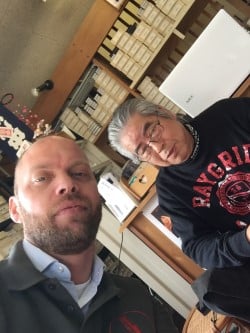- Knives
- Tools
- Engraving
- Giftcards
- Book
- Sharpening Box
- Shop
- Workshop
- Info
Your cart is currently empty
Nakiri • 165 mm • stainless san mai • pakka • Shirogami white #1• western handle • for right- and left hand use
A classic Fujiwara, with its iconic finger rest. Using the pinch grip, this knife is easy to control. Completely made by hand, a raw look and an extremely thin and razor sharp finish. Recommended to professionals and experienced home cooks.
Thinned by hand on the Kaiten Toshi ( Japanese water wheel ) and finished with a micro bevel for extreme sharpness. The thin san mai blade is constructed out of three layers: stainless on the outside and a core of the high end traditional white # 1 steel. Enjoy a high end carbon knife, with the maintanance of a stainless knife. The edge is super sharp and delicate cutting in the beginning is advised. The hammered tsuchime finish on this blade gives the knife its raw identity.
This traditional steel is not named after its colour, but named after the colour of its paper wrapping, in which it is stored in the Hitachi steel factory in Japan. There are 3 grades of Shirogami white steel: #1,#2 & #3. From these 3, #1 contains the highest amount of carbon and #3 the lowest. Generally we say at our knifeshop, grade #1 can be made extremely sharp, but will be a little more fragile as #3. While #3 is a little softer, it's also easier to resharpen, but has less edge retention. Grade #1 & #2 is most common in white steels. White steel is a refined steel with a low percentage of iron, loved by many, as it is relatively easy to maintain. In practice it can be maintained with a whetstone and in a short amount of time it will become very sharp. This does not mean that these knives never have to be resharpened by a professional, even all knives in Japan need to be refurbished at a certain moment. This Shirogami steel is embraced by sushi chefs who demand extreme sharpness of their knives. White steel oxidates relatively quick and therefore needs to be maintained more often, but on the other hand you will get all benefits of this beautiful steel characteristics.
In 2019 Fujiwara knives have celebrated their 150 years of craftmanship, nowadays run by president Kojiro san, who is the 4th generation owner of this family business. Forging still in a traditional and authentic way, similar to his ancestors, who were forging katanas, the Japanese swords. By improving this process, but maintaining to traditional knife making, his knives are nowadays comparably as sharp or even sharper, as swords in the past. Fujiwara is well known for its robust knives. Maybe not the flawless finish as you can expect in this range, but this inferior finish has a name in Japanese: wabi sabi.
In 2018 I've met Kojiro san in person in his small workshop in Tokyo. Star strucked as I was, I forgot how to speak... "Are you gonna introduce yourself?" my wife asked. Social media can influence your expectations. Of course I had a reality check and Koijiro san is a very normal and approachable knife maker, actually a joker as he was joking with my wife the whole time. Side by side we have worked for a day in his small workshop near his home, finishing handles and sharpening blades. Kojiro san is a passionate craftsman and a 4th generation owner of a family business. This day I learned about tradition, craftmanship and Japanese history of knifemaking and built a foundation for a long lasting business relationship. Arigato Gozaimasu Kojiro san.
